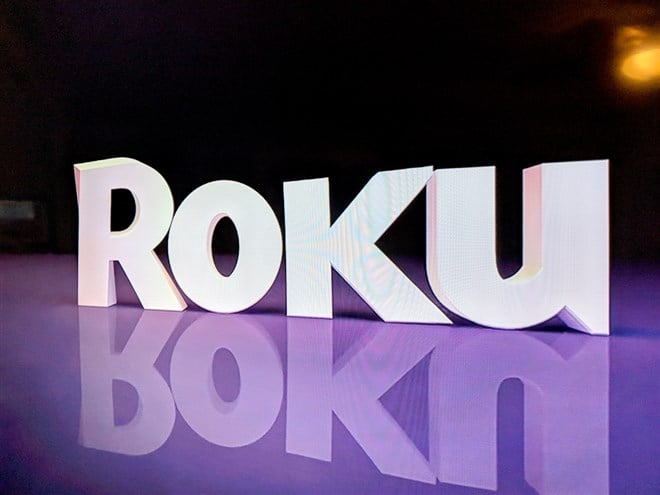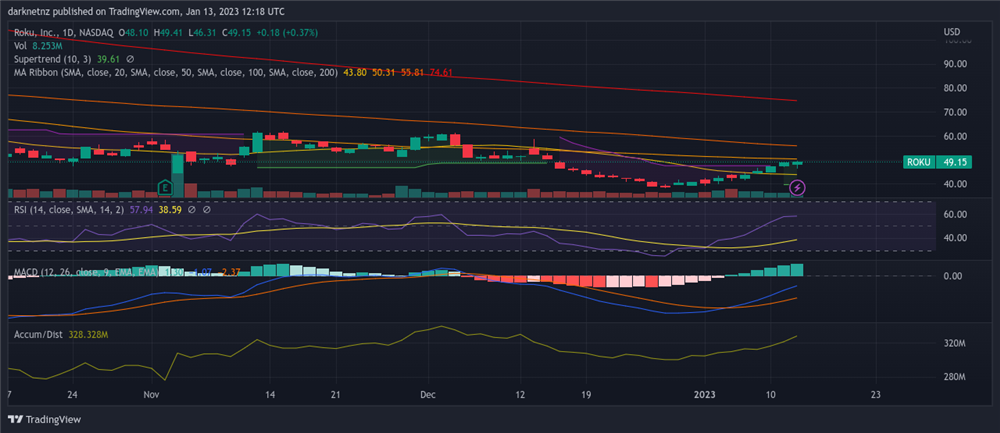
The Roku Inc (NASDAQ: ROKU) stock price has gained an impressive amount over the past five days, thereby reversing the sell-off of its share over the past month.
The TV streaming stock is up 15.67% from Jan 6 and closed 0.37% higher in yesterday's trading session.
Roku's stock price appreciation walked largely in step with gains observed in the broader market. The NASDAQ Composite index climbed 6.15% over the past five days and slightly gained 0.64% yesterday.
So some of the share's performance could be chalked up to a rising tide lifting all boats, courtesy of the NASDAQ and a turbulent start of the year. But let's look beyond the volatility and instead to the drivers that could determine Roku's performance moving forward.
Is Roku undervalued?
For Roku's technicals, there are some indications that it recently made an oversold bounce to the upside that occurred on Dec 29. Since then, the stock has enjoyed a brief rally with increased accumulation by bulls. The faster-moving simple averages (SMAs) are also in the process of the crossing as the rally continues, which could be confirmation that a new uptrend has kicked off.
The pivotal 200-SMA, however, is still a ways from the company's stock price as it shows a value of $74.61 at the time of writing, suggesting things haven't changed that much for its technicals in the bigger picture.
Some short-term relief to get it the Supertrend was changing from red to green, measured via the 10-day average true range (ATR) that created a buy signal on Jan 11.

As for the company's fundamentals, things are a bit hazier. One of the company's main problems is growing its top and bottom-line revenue and earnings numbers, which took a beating in FY2022. It's unsurprising these companies saw a reversion in these metrics as COVID-19 pushed them far beyond their long-term mean values.
Reversion to the mean
In sports management, there's a saying that one of the worst things that can happen to a professional soccer coach is for his team to win five games in a row. This winning streak, which cannot be sustained in the long term, becomes the new performance benchmark.
The problem is that the players aren't playing better, and the coach isn't coming up with an exceptional strategy - it's just variance doing its thing. The performance will always come back to the baseline average sooner or later.
The price of streaming service stocks and NASDAQ-listed stocks, in general, also walked way too far from their logical valuations. Even executives at tech companies overestimated their growth prospects, hence the massive layoffs we saw last year that were overwhelmingly concentrated in the technology sector.
The point is that people shouldn't be too bothered by the reversion in Roku's and other streaming stock prices as they were never realistic, to begin with. Now that the pandemic money looks to be flushed out, we're starting to see more common-sense appraisals by the market.
Headwinds for next year
Roku's primary operating segment generates revenue from advertisers on its content platform. A slow rate of growth is expected for content owners across the board this year, according to a report published by Manga. Due to economic uncertainty, ad revenue is expected to rise by only 5% YoY, $833 billion, but television and publishing ad sales are also expected to contract by 3% and 4%.
The bigger issue is that although Roku has become a popular streaming device, it faces problems with its business model. The main issue is that Roku relies heavily on content providers for its streaming services. This means that Roku has to negotiate licensing deals with content providers, which can be time-consuming and expensive.
Roku is competing with other streaming devices such as Apple TV, Amazon Fire TV, and Chromecast, which all have different ways of making money. This makes it difficult for Roku to remain competitive and profitable.
Overall, Wall Street thinks Roku is in a tough time next year. It expects its losses to steepen, with its projected earnings per share (EPS) dropping from ($3.66) to ($4.27) in the negative territory. Adding to the drama is that short sellers have taken an interest in the stock, with the short interest ratio currently standing at 8.66%.
